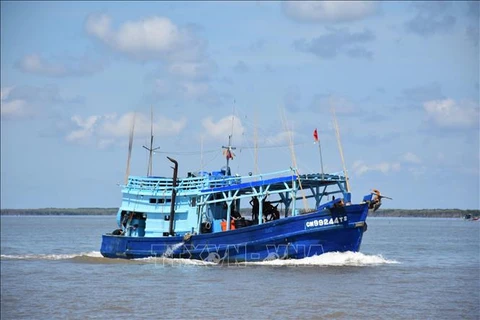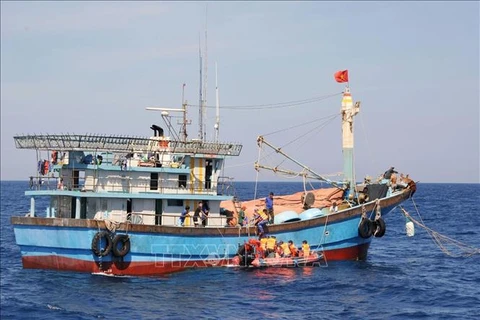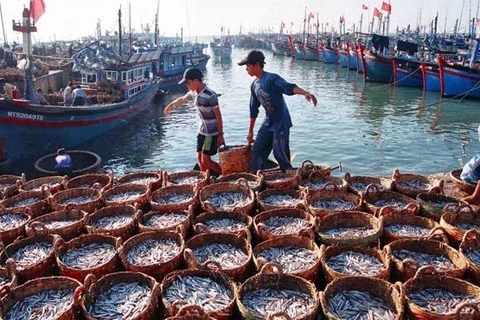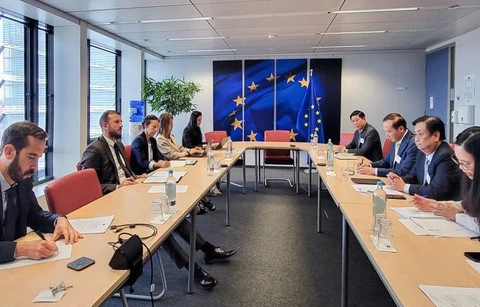Kien Giang (VNA) – Mekong Delta provinces have intensified their efforts to prevent illegal, unreported and unregulated (IUU) fishing in a bid to have the European Commission (EC)’s “yellow card” warning against Vietnamese seafood lifted.
Kien Giang province reported no fishing boats violating foreign waters in recent months, according to the provincial steering board for IUU fishing prevention and control.
The result was attributed to the local authorities’ application of drastic and synchronous measures against IUU fishing, with a wide range of inspections and enhanced communications work to raise local fishermen’s awareness of current regulations on IUU fishing prevention put in place, said Deputy Director of the provincial Department of Agriculture and Rural Development Quang Trong Thao, who is also deputy head of the steering board.
To date, the vessel monitoring system (VMS) has been installed on 3,652 fishing boats out of 3,707 vessels with a length of 15 metres or longer. Meanwhile, the remaining ships are being listed for monitoring, with all of them out of operation.
Since the outset of the year, competent authorities have made more than 290 calls for 225 boats travelling outside Vietnamese waters, and nearly 20,000 calls for 1,811 fishing boats with VMS disconnected.
Thao also said that Kien Giang police have joined hands with their counterparts in the provinces of Ca May, Bac Lieu, Soc Trang, Tra Vinh, Ben Tre, Tien Giang, Ba Ria – Vung Tau, and Binh Thuan and HCM City to prevent illegal immigration for illegal fishing.
Meanwhile, Tra Vinh province has directed its Department of Agriculture and Rural Development to control the registration and licensing of local fishing boats, those operating in the local waters, and those without the installation of VMS.
The border guard is responsible for controlling the number of vessels docking at and departing from local ports, and updating data on the national fisheries database VNFishbase, and prevent all vessels failing to comply with the VMS regulations from operating.
According to Deputy Director of the provincial Department of Agriculture and Rural Development Tran Van Dung, the department has completed registration and licensing procedures, installation of the VMS and update data of local fishing boats on the national fisheries database.
All of the local vessels have been monitored while fishing at sea via the VMS, and strictly complied with current regulations on certificates and traceability of caught seafood.
Tra Vinh has 879 registered fishing boats, including 272 with a length from 15 metres. By the end of August, all of the local vessels were equipped with the VMSs.
Communications work has been given a focus to raise public awareness of illegal fishing in foreign waters as well as legal fishing grounds.
Inspectors from the EC are scheduled to come to Vietnam to examine the country’s efforts on IUU fishing prevention and control in October instead of May.
According to the EC’s Directorate-General for Maritime Affairs and Fisheries (DG-MARE), Vietnam has to take more stringent measures in preventing IUU fishing and violations of foreign waters with 100% of the cases investigated and handled, including those of vessels arrested at foreign seas and ships that do not maintain monitoring devices according to regulations.
The European Union (EU) is one of the top export markets for Vietnamese seafood, only behind the US and Chinese markets. It contributed approximately 1.3 billion USD in Vietnam’s total seafood export turnover of 11 billion USD in 2022.
The EU has regulations on certifying the origin of imported seafood, thereby classifying countries exporting seafood products with the green, yellow and red cards, or a trade ban at the most critical level.
With a yellow card, 100% of Vietnam’s seafood exports to the EU are subject to inspection, which reduces the export volume, increase the costs and delivery time./.
Kien Giang province reported no fishing boats violating foreign waters in recent months, according to the provincial steering board for IUU fishing prevention and control.
The result was attributed to the local authorities’ application of drastic and synchronous measures against IUU fishing, with a wide range of inspections and enhanced communications work to raise local fishermen’s awareness of current regulations on IUU fishing prevention put in place, said Deputy Director of the provincial Department of Agriculture and Rural Development Quang Trong Thao, who is also deputy head of the steering board.
To date, the vessel monitoring system (VMS) has been installed on 3,652 fishing boats out of 3,707 vessels with a length of 15 metres or longer. Meanwhile, the remaining ships are being listed for monitoring, with all of them out of operation.
Since the outset of the year, competent authorities have made more than 290 calls for 225 boats travelling outside Vietnamese waters, and nearly 20,000 calls for 1,811 fishing boats with VMS disconnected.
Thao also said that Kien Giang police have joined hands with their counterparts in the provinces of Ca May, Bac Lieu, Soc Trang, Tra Vinh, Ben Tre, Tien Giang, Ba Ria – Vung Tau, and Binh Thuan and HCM City to prevent illegal immigration for illegal fishing.
Meanwhile, Tra Vinh province has directed its Department of Agriculture and Rural Development to control the registration and licensing of local fishing boats, those operating in the local waters, and those without the installation of VMS.
The border guard is responsible for controlling the number of vessels docking at and departing from local ports, and updating data on the national fisheries database VNFishbase, and prevent all vessels failing to comply with the VMS regulations from operating.
According to Deputy Director of the provincial Department of Agriculture and Rural Development Tran Van Dung, the department has completed registration and licensing procedures, installation of the VMS and update data of local fishing boats on the national fisheries database.
All of the local vessels have been monitored while fishing at sea via the VMS, and strictly complied with current regulations on certificates and traceability of caught seafood.
Tra Vinh has 879 registered fishing boats, including 272 with a length from 15 metres. By the end of August, all of the local vessels were equipped with the VMSs.
Communications work has been given a focus to raise public awareness of illegal fishing in foreign waters as well as legal fishing grounds.
Inspectors from the EC are scheduled to come to Vietnam to examine the country’s efforts on IUU fishing prevention and control in October instead of May.
According to the EC’s Directorate-General for Maritime Affairs and Fisheries (DG-MARE), Vietnam has to take more stringent measures in preventing IUU fishing and violations of foreign waters with 100% of the cases investigated and handled, including those of vessels arrested at foreign seas and ships that do not maintain monitoring devices according to regulations.
The European Union (EU) is one of the top export markets for Vietnamese seafood, only behind the US and Chinese markets. It contributed approximately 1.3 billion USD in Vietnam’s total seafood export turnover of 11 billion USD in 2022.
The EU has regulations on certifying the origin of imported seafood, thereby classifying countries exporting seafood products with the green, yellow and red cards, or a trade ban at the most critical level.
With a yellow card, 100% of Vietnam’s seafood exports to the EU are subject to inspection, which reduces the export volume, increase the costs and delivery time./.
VNA
























